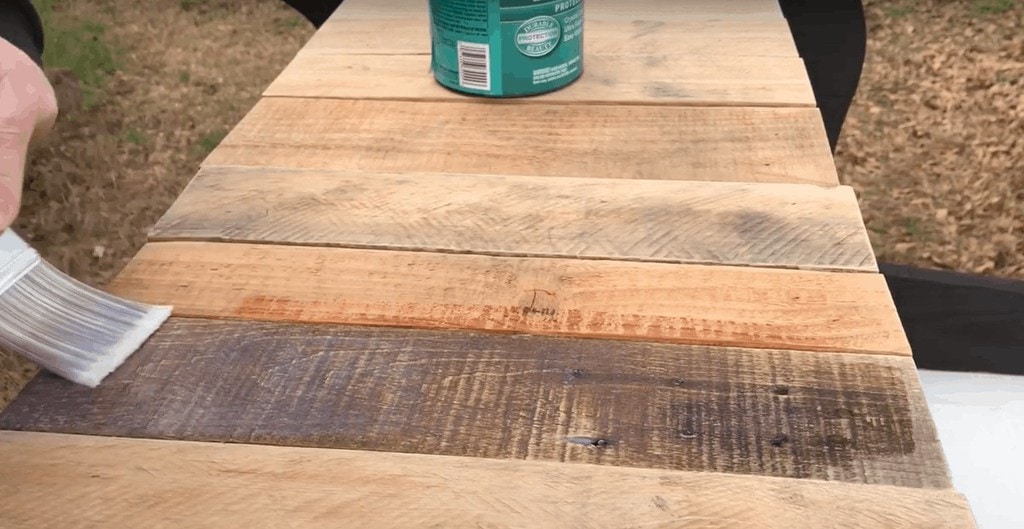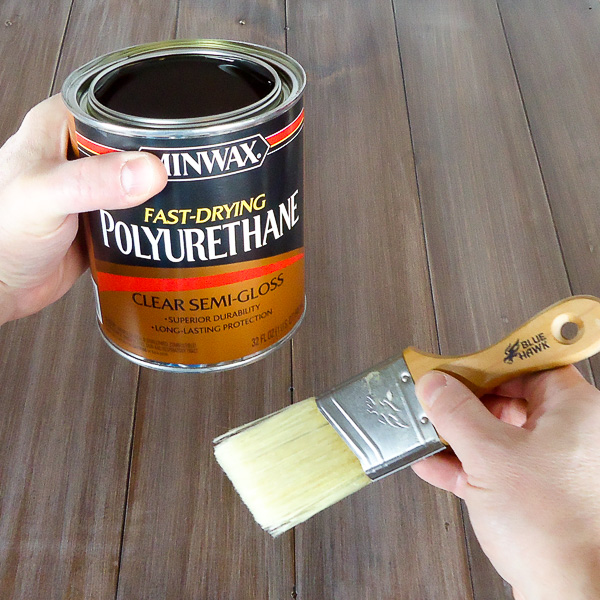- Get link
- X
- Other Apps
Officially 6 months after opening. I have found finishes to be very expensive and shelf life is very important I use a product called Bloxygen it contains an inert gas Argon that lays on top.
 Polycrylic Vs Polyurethane Don T Use The Wrong One For Your Finish
Polycrylic Vs Polyurethane Don T Use The Wrong One For Your Finish
By the DIY experts of The Family Handyman Magazine Examine the remaining finish Check the remaining material to make sure its clear and particle-free.

Does polyurethane go bad. It would make it possible to apply but it wont be as good as new. Polyurethane is a type of plastic that is used to manufacture many different types of materials. Failing to sand between coats of.
Because polyurethane will not decompose readily every effort should be made to recycle this material instead of disposing. Do you have to remove polyurethane before staining. Contains UV absorbers that protect the finish and the wood from the suns rays.
In spite of this PU glues are less reactive than Cyanoacrylate so you can leave Polyurethane for much longer periods in a sealed container. Gloss oil-based varnish polyurethane and Danish oil can last 10 or 20 years though satin finishes and stains may fail sooner as pigments and flattening agents disable the driers. It prevents air from leaking in the can.
How long does oil based polyurethane last. When you store paint varnish polyurethane or other finishes store the can upside down. Shellac though can go bad in under a year.
The shelf life is only valid concerning unopened cans. Shellac though can go bad in under a year. Short-term exposure to temperatures above 180C 350F Long-term exposure to humid environments greater than 70C 158F How do you make polyurethane dry faster.
Polyurethane a petrochemical resin that contains isocyanates is a known respiratory toxin. Recoat the finish when it turns dull typically once a year. But it might be worth trying your stuff on a test piece.
Thin coats dry faster look better and provide more durability. When polyurethane is applied to the wood flooring cabinets andor furniture in a home it can produce an unmistakable smell in the airspace that is full of an amalgam of chemicals. Shellac though can go bad in under a year.
Polyurethane glues react with moisture just like Superglue. 6-8 years sounds like a long time to me. Once a container is open then the oxidation process will proceed even in the abscence of oxygen from what I understand.
Shellac though can go bad in under a year. Mistake 5 Dry is not the same as cured. Shellac though can go bad in under a year.
Polyurethane stain blends are available in the most-common wood stain colors. Applying too much finish only results in runs drips or a thick layer that never completely dries or hardens. It apparently does have a shelf life.
Gloss oil-based varnish polyurethane and Danish oil can last 10 or 20 years though satin finishes and stains may fail sooner as pigments and flattening agents disable the driers. Water-based coatings and paints can also be viable longer than three years. Just as plywood gets its strength from layers of thin wood so does a finish.
Children and people with respiratory diseases are especially sensitive to the toxic chemicals in polyurethane. Exact values depend on the polyurethane formulation. Water-based coatings and paints can also be viable longer than three years.
Water-based coatings and paints can also be viable longer than three years. They are applied over the old finish and arent designed to soak in so you dont have to sand or strip off the polyurethane. Polyurethane glues like Gorilla Glue is more similar to Cyanoacrylate in terms of chemistry than it is to PVA.
A repipe specialist will provide you with the best price combined with. Made with a special blend of oils and resins that allows it to flex as the wood surface expands and contracts. Exterior doors trim and furniture.
Gloss oil-based varnish polyurethane and Danish oil can last 10 or 20 years though satin finishes and stains may fail sooner as pigments and flattening agents disable the driers. Uncured polyurethane can cause breathing problems such as asthma. Gloss oil-based varnish polyurethane and Danish oil can last 10 or 20 years though satin finishes and stains may fail sooner as pigments and flattening agents disable the driers.
Basically the distinction is one of bad versus worse not good versus bad Myth. Does polyurethane go bad. Also does spar urethane go bad.
The following conditions will all irreversibly degrade polyurethane and should be avoided. Replacing poly pipes costs an arm and a leg. Water-based coatings and paints can also be viable longer than three years.
Actually replacing poly is about the same cost as recarpeting your home or putting on new roof shingles--providing you use a repipe specialist. Polyurethane plastic can be found in packaging electronics bedding apparel footwear and various other materials and products. Water or oil-based polyurethane thats been sitting on a shelf and has skinned over can often still be used for natural finishes as long as the liquid underneath is in good condition.
Unlike a water-based solution oil-based polyurethane undergoes a chemical reaction as it dries which is not completely undone by thinning. Make sure the top is on securely.
 Wood Finish Shelf Life Can Stains And Finishes Go Bad A Butterfly House
Wood Finish Shelf Life Can Stains And Finishes Go Bad A Butterfly House
 The 7 Myths Of Polyurethane Popular Woodworking Magazine
The 7 Myths Of Polyurethane Popular Woodworking Magazine
 The 7 Myths Of Polyurethane Popular Woodworking Magazine
The 7 Myths Of Polyurethane Popular Woodworking Magazine
Bad Floor Refinishing Job Chicago Flooring Innovations
 Let Me Talk You Out Of Staining Your Floor Wood Floor Techniques 101
Let Me Talk You Out Of Staining Your Floor Wood Floor Techniques 101
 What S Wrong With The Polyurethane On This Hardwood Floor Refinishing Job Home Improvement Stack Exchange
What S Wrong With The Polyurethane On This Hardwood Floor Refinishing Job Home Improvement Stack Exchange
 3 Reasons Why I Don T Use Polyurethane Saws On Skates
3 Reasons Why I Don T Use Polyurethane Saws On Skates
Bad Floor Refinishing Job Chicago Flooring Innovations
 Polyurethane Finish Cloudy Finishing
Polyurethane Finish Cloudy Finishing
 Polyurethane Finish Cloudy Finishing
Polyurethane Finish Cloudy Finishing
 Fixing Polyurethane Bubbles Puddles Runs And Brush Marks Youtube
Fixing Polyurethane Bubbles Puddles Runs And Brush Marks Youtube
Bad Floor Refinishing Job Chicago Flooring Innovations
 What S Wrong With The Polyurethane On This Hardwood Floor Refinishing Job Home Improvement Stack Exchange
What S Wrong With The Polyurethane On This Hardwood Floor Refinishing Job Home Improvement Stack Exchange
 The 7 Myths Of Polyurethane Popular Woodworking Magazine
The 7 Myths Of Polyurethane Popular Woodworking Magazine
Comments
Post a Comment